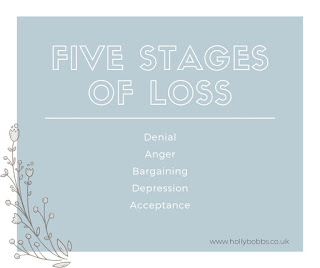The stages of dealing with this are the same as the stages of grief -
Denial: it's not happening, it's the wrong diagnosis, I'm fine, I'll get better, I can just keep pushing through.
Anger: Rage at the world and its wife at the cards you have been dealt, the things you can never get back, the life forever changed.
Bargaining: If I do this, then I can do that.
Depression: It's never going to change, I'll never be better, my life is ruined, everything is awful.
Acceptance: ...well, that's a work in progress!
Working through these stages is a major part of dealing with your illness and will seem a job itself. I've put together some things I've picked up along the way that may help you handle this new stage of your life.
1. Research Your Illness
Nobody around you will be able to understand your illness until you do, and knowing what you're up against is half the battle. Not only will this help you comprehend what you are dealing with but it will also help along the road to accepting all these new symptoms and the emotions that come with being ill.2. Speak To Professionals
The first port of call to diagnosis should be your GP so I would imagine by the time you are reading this you have already accessed their help. Hopefully they have referred you on to a local clinic or department for assessment and support, but if not ask for them to do so. Speaking to specialists who know the ins and outs of your illness is vital as they can help you manage your symptoms and support you as you move forward.There are also some fantastic charities out there who can offer support and even refer you to relevant services. A quick Google should bring them up and you will be able to call in a local office, ring and even email if you cannot face a conversation in person.
Finally if you are struggling mentally with your diagnosis and your illness in general do not struggle alone. Most areas have a counselling service you can either self refer to or your GP or specialist professional can refer you on to.
3. Be Open With Those Around You
I have always be an honest and open person with my life and that was no different with talking about my illness. However what I wasn't totally open with was how much if affects me and my immediate family's lives and what support I need to get through each day. That led to people not understanding and judging me on what I did and did not do. I have learnt over the years that having people around you who understand, and who are also willing to understand, is crucial as those are the people you will need to lean on when times get hard.4. Ask For Help
In today's society we are taught to work, work and work even more and asking for help is seen as a sign of weakness. This thought process is damaging for most people, but even more so for those with a chronic illness as getting support from others is vital. Every day tasks will seem like mountains at times and simple things like showering, preparing meals and even getting out of bed can seem insurmountable. Asking for help when you need is nothing to be ashamed of, in fact it should be celebrated as it is not always easy to do and there is a stigma of shame attached if you do. Facing up to this and realising you need other people's help is so important.5. Find Other Sufferers
Getting help from able people around you is one thing, but nobody can understand and resonate with you like others who are in the same position. I have found speaking to others who have the same illness as me really helps me feel understood and heard when at times I feel very alone. There are many way to do this including local support groups, through your specialist team who meet other sufferers themselves and so can arrange to put you in contact and through the Internet. Facebook groups in particular have been vital to me and I have listed several at the end of this post that I have found useful.6. Accept Your Bad Days
You will have bad days. Days where you can't get out of bed, when things don't get done and where you feel like you're failing. It is important and accept that these days will come, but they will also go. The key is to ride the tide, let it come and rest as much as you need. There will be brighter days ahead.I hope some of these tips help you to deal with this huge change to your life and one day lead to acceptance. I'm definitely still a work in progress myself and every day brings a fun new set of challenges. If you want to talk more you can find me on Facebook.
Here are a list of places you can access support:
Action For ME
Coeliac UK
FMA UK (fibromyalgia charity)
Good Samaritans
Lupus UK
ME Association
Mind (mental health charity)
MS Society
Pain UK
Facebook Groups:
Fibromyalgia and Chronic Illness Family UK
ME/CFS Community
ME / Chronic Fatigue Syndrome UK
ME/CFS Parents
The Unchargeables Facebook Group












